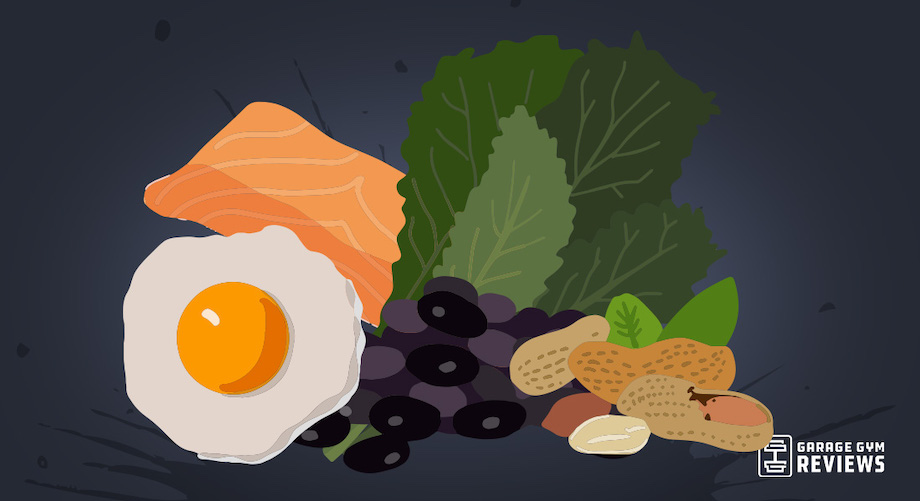We test and review fitness products based on an independent, multi-point methodology. If you use our links to purchase something, we may earn a commission. Read our disclosures.
If you’re serious about your fitness goals, you’ve likely heard about the importance of getting enough protein and may be wondering how much protein you should eat to lose weight. But how exactly does protein help, and do you need to guzzle protein shakes all day to see results?
Protein is one of three macronutrients, along with carbohydrates and fat, that the body needs to function at its best. It’s arguably the most helpful macro for weight loss due to its ability to help us feel full and its role in minimizing muscle loss when keeping your calorie intake low.
With many high-protein foods and supplements available, meeting your protein goals doesn’t have to be difficult. Keep reading to learn how much protein is ideal for weight loss and the best ways to include enough protein in your diet.
Medical disclaimer: This article is intended for educational and informational purposes only. It is not intended as a substitute for medical advice. For health advice, contact a licensed healthcare provider.
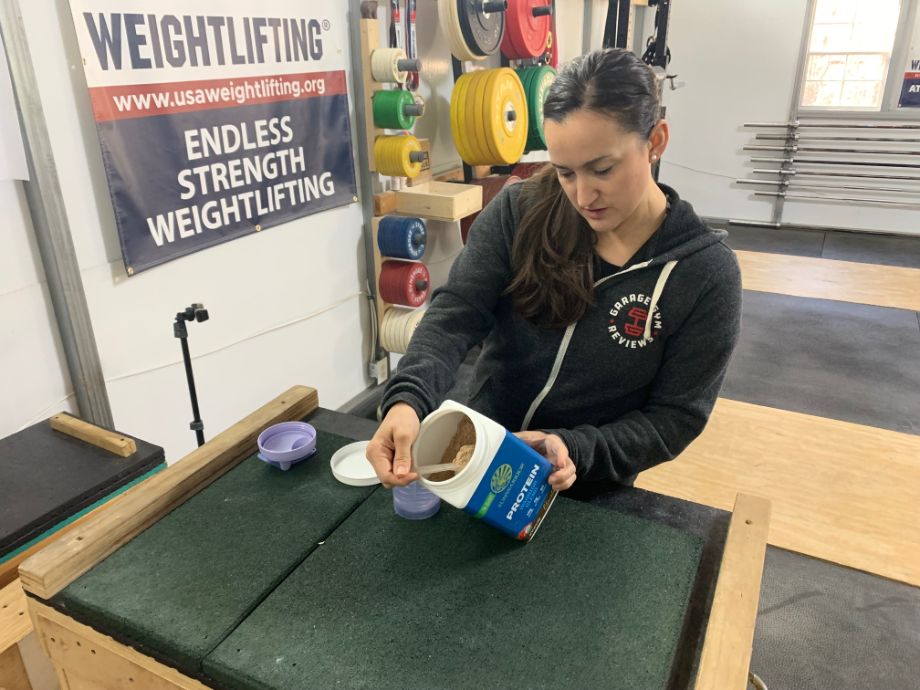
How Much Protein Should I Eat to Lose Weight?
The starting point for protein is 0.8 grams of protein for every kilogram that you weigh. This is the minimum amount of protein most people need to avoid a deficiency and is known as the Recommended Dietary Allowance (RDA).
Research suggests, however, that daily protein intakes higher than the RDA may be extra helpful for weight loss. How much protein, exactly? Let’s see what the evidence suggests.
RELATED: High-Protein Foods for Weight Loss
One consideration for protein is its ability to minimize or prevent muscle loss while losing weight. Unfortunately, we don’t just burn fat during weight loss—we also burn muscle. Fortunately, a higher-protein diet can help prevent muscle loss during a period of weight loss. According to a 2011 review in the Journal of Sports Sciences1, protein intakes up to 1.8-2.0 grams of protein per kilogram of body weight may help prevent the loss of muscle mass while in a caloric deficit.
When adding strength training in the mix, a 2017 position statement by the International Society of Sports Nutrition2 states that a range of 1.6-2.4 grams of protein per kilogram of body weight can promote fat loss while minimizing muscle loss in a caloric deficit. The National Academy of Sports Medicine (NASM)3 offers a similar recommendation of 1.6-2.2 grams of protein per kilogram.
People with obesity may see benefits for muscle mass with slightly lower intakes of at least 1.2 grams protein per kilogram during weight loss, according to a 2015 randomized controlled trial in Clinical Nutrition4.
So while there isn’t a consensus on the exact amount of protein needed during weight loss, recommendations range from 1.6-2.4 grams of protein per kilogram of body weight in order to optimize lean body mass.
Calculating Your Daily Protein Needs
Let’s use an example to calculate the amount of protein a 150-pound person would need using a middle-of-the-road recommendation of 2 grams of protein per kilogram of body weight.
First, divide weight (in pounds) by 2.2 to get weight in kilograms.
150 pounds / 2.2 = 68.2 kilograms
Then, multiply weight in kilograms by grams of protein.
68.2 kilograms * 2 grams protein = 136.36.
Using this simple calculation, we see that a person weighing 150 pounds would need to eat about 136 grams of protein per day to support their weight loss/fat loss goals.
Keep in mind that protein needs will vary based on individual factors such as age, energy expenditure, body weight, and the type and intensity of exercises you participate in. You may need to adjust your protein intake as your fitness routine changes.
RELATED: Cardio vs Weights for Weight Loss
Benefits of Protein
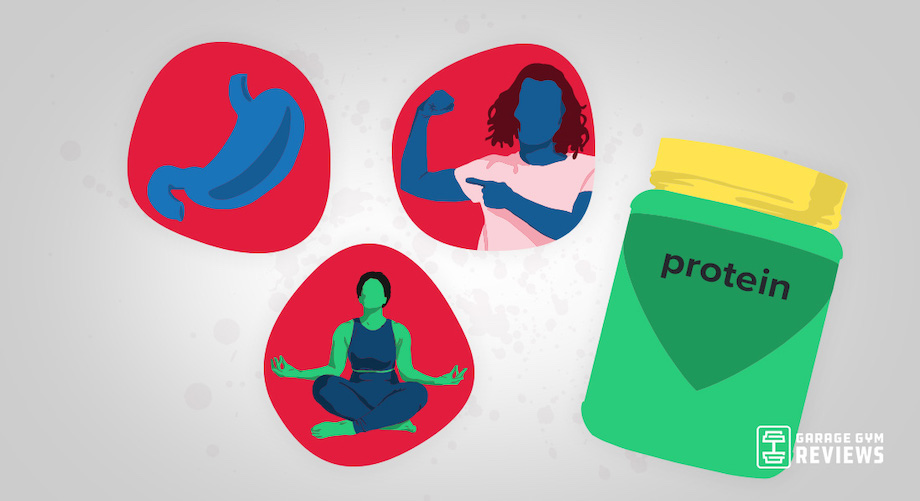
Thermic effect of food
The amount of energy (or calories) that we burn each day is known as a person’s energy expenditure. Energy expenditure includes the energy required for our bodies to function at rest (resting energy expenditure), energy required for physical activity, and energy required to digest and absorb nutrients from food. The latter is known as the “thermic effect of food.”
Each macronutrient requires differing amounts of energy to be digested and absorbed, with protein requiring the most effort compared to carbohydrates and fat. As explained in a 2020 review article in the Journal of Obesity and Metabolic Syndrome5, the metabolism of fat requires 0-3% of our total energy intake, carbohydrates require 5-10%, and protein requires 20-30%.
So, what does this mean? Put simply, eating a higher protein diet can increase your metabolism and help you burn more calories compared to a low or moderate protein diet.
Satiety
One of the most helpful benefits of protein is that it helps us feel full longer. Higher protein diets have been shown to increase levels of hormones in the bloodstream that cause feelings of fullness while also decreasing hormones like ghrelin that make you feel hungry.
As mentioned above, it takes more energy for the body to digest protein. This biological process also plays a role in helping us feel more full, according to the same 2020 review5 mentioned above, as does having more amino acids present in the bloodstream as seen with higher protein diets.
RELATED: Benefits of Protein
Build or preserve muscle while losing fat
We learned earlier that the body doesn’t discriminate during weight loss, burning both fat and muscle for energy. Research suggests, however, that a higher protein diet can minimize the amount of muscle we burn, especially when combined with a resistance training program.
Resistance training tears down muscle fibers and encourages the body to use amino acids, the “building blocks” of muscle, to repair and build muscle tissue. Higher protein diets provide plenty of amino acids, ensuring that a portion of the daily calories we eat will be diverted toward preserving or building muscle mass. In this pro-muscle environment, the body will burn more fat as energy and lead to improved body composition over time.
Just be sure to spread your protein evenly throughout the day rather than getting most of it at dinner. A 2017 review published in Advances in Nutrition6 suggests that spreading your protein throughout the day may be more helpful for preserving lean body mass.
Sources of Protein
Animal proteins
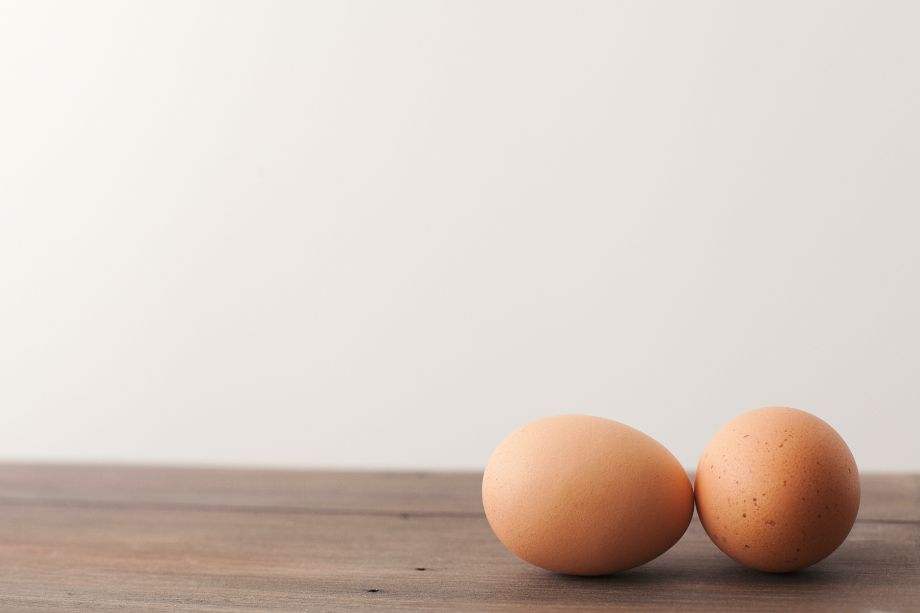
For many people, meat and dairy foods are typically what come to mind when discussing high-protein foods. They’re often considered to be some of the best sources of protein thanks to their high bioavailability. Animal-based proteins include:
- Beef
- Pork
- Chicken
- Turkey
- Fish
- Greek yogurt
- Milk
- Cheese
- Eggs
Many health organizations, such as the American Heart Association7, recommend choosing leaner proteins like chicken, turkey, fish, and low-fat dairy most often to avoid consuming too much saturated fat and increasing your risk of developing heart disease.
Limiting the amount of red meat you eat may also help reduce your risk of certain cancers. The American Institute for Cancer Research8 suggests limiting red meat to no more than three servings a week, or about 12-18 ounces. They also recommend eating little to no processed meat, considered by the World Health Organization9 to be cancer-promoting. Processed meats include foods like bacon, deli meat, and hot dogs.
Plant proteins
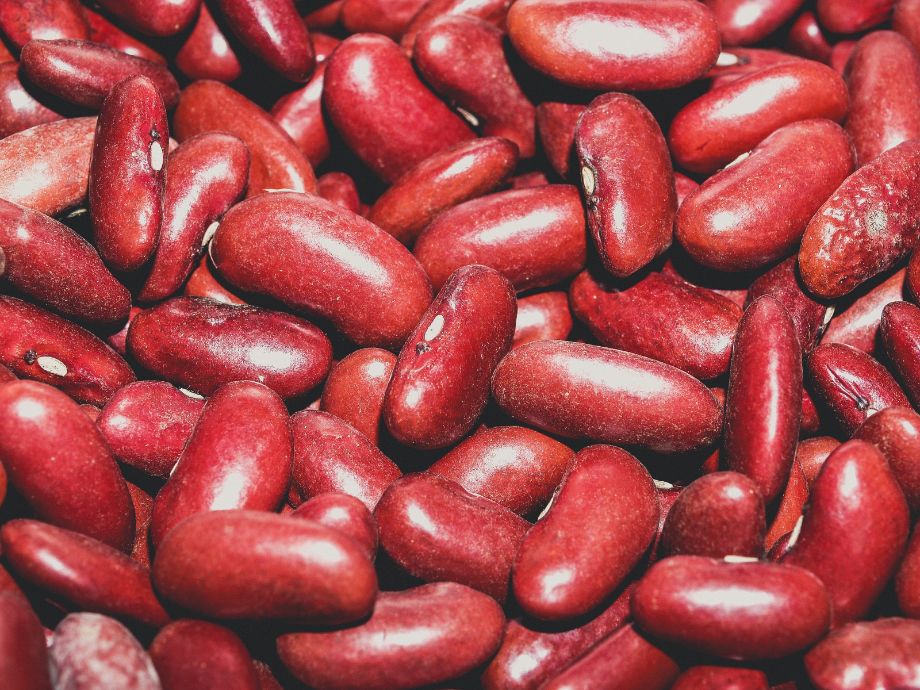
Plant-based foods are becoming more widely recognized for their protein content thanks to the increasing popularity of plant-based diets. Some of the best sources of plant-based protein include:
- Tempeh
- Seitan
- Tofu
- Lentils
- Beans (Black beans, chickpeas, kidney beans, etc.)
- Textured vegetable protein
- Soy milk
- Nuts
- Seeds
- Whole grains
Soy-based foods, beans, and legumes tend to have the most protein, followed by nuts and seeds. Even whole grains provide a small amount of protein, which adds up when they’re included regularly in meals.
There’s a common myth that plant-based foods can’t provide enough protein because they’re “incomplete,” but this is overly simplistic. Some plant-based foods like soy, quinoa, and chia seeds are complete proteins, providing all nine essential amino acids required by the body. Others may be slightly lacking in one or two amino acids (for example, legumes are slightly low in methionine and grains tend to be slightly low in lysine).
This doesn’t mean that you need to obsess over combining these foods, however. Eating a variety of plant-based foods throughout the day should be enough to meet your needs, according to the Academy of Nutrition and Dietetics10.
Protein supplements
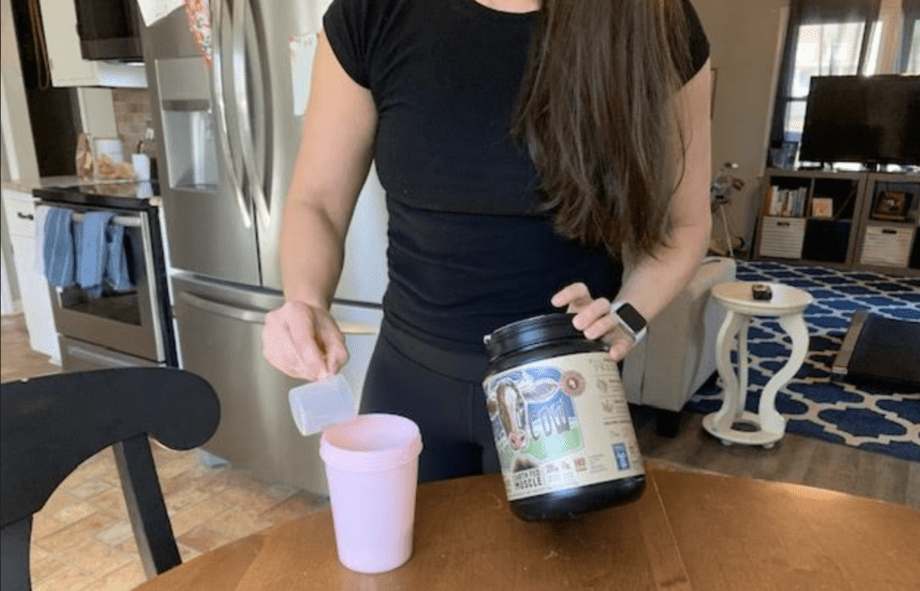
Protein supplements are a convenient, quick way to help in meeting your protein goals. There are many to choose from, with the most common types being:
- Protein powders
- Ready-to-drink protein shakes
- Protein bars
- Meal replacement bars and shakes (these often contain more carbohydrates and fat than protein bars and shakes)
RELATED: Best Protein Bars
These products are available in a wide range of flavors and use a variety of protein sources. The most common is whey protein, although vegan protein powders, shakes, and bars are also available. These are typically made from pea protein, soy protein, or hemp protein.
Keep in mind that while protein supplements can be helpful, it’s important to avoid completely replacing protein-rich foods and balanced meals in your diet.
How Much Protein Should I Eat to Lose Weight: Final Thoughts
Higher protein intake during weight loss has many benefits, including a higher metabolic rate, increasing feelings of fullness, and prioritizing fat loss while minimizing or preventing the loss of muscle when combined with resistance training.
The amount of protein you need will vary based on factors like age, body weight, and the types of exercise you participate in. Recommendations are typically within the range of 1.6-2.4 grams of protein per kilogram of body weight to assist with weight loss.
Eating plenty of protein-rich foods and including protein supplements when needed can help you meet your health and fitness goals. If you need personalized help, a registered dietitian can help determine your dietary protein needs.
How Much Protein Should I Eat to Lose Weight: Q&A
How do I calculate how much protein I need?
Protein needs are typically calculated using your body weight to provide a range of protein as a daily target. Research suggests that protein needs ranging from 1.6-2.4 grams of protein per kilogram of body weight are optimal for supporting fat loss while minimizing muscle loss.
Let’s use a 150-pound person as an example.
First, divide weight (in pounds) by 2.2 to get weight in kilograms.150 pounds / 2.2 = 68.2 kilograms
Then, multiply weight in kilograms by the grams of protein at the lower end of the range.68.2 kilograms * 1.6 grams protein = 109 grams
Lastly, multiply weight in kilograms by the grams of protein at the higher end of the range.68.2 kilograms * 2.4 grams protein = 164 grams
Using this method, a person weighing 150 pounds would need to eat between 109-164 grams of protein per day to support their weight/fat loss goals. The more resistance training you do, you’ll likely fall closer to the higher end of this range.
Is 100 grams of protein a day enough to lose weight?
Protein recommendations for weight loss will vary based on many factors, such as your age, weight, and physical activity level. It’s typically recommended to get 1.6-2.4 grams of protein per kilogram of body weight in order to lose body fat and preserve as much muscle as possible during weight loss, which would be about 109-164 grams of protein for someone weighing 150 pounds.
For this person, 100 grams of protein per day might not be quite enough to see the most benefits.
Can I lose weight by eating a lot of protein?
High protein diets can help you lose weight, but protein isn’t the only important part of the puzzle. To lose weight, you’ll also need to be in a caloric deficit—ideally using a combination of diet and exercise.
Is 30 grams of protein enough to lose weight?
30 grams of protein per day is likely too low to provide much benefit for weight loss, considering that typical protein recommendations for losing fat while maintaining muscle are 1.6-2.4 grams of protein for every kilogram you weight. For a 150-pound person, this would be about 109-164 grams of protein per day.
These statements have not been evaluated by the Food and Drug Administration. This product is not intended to diagnose, treat, cure, or prevent any diseases.
References
- Phillips SM, Van Loon LJ. Dietary protein for athletes: from requirements to optimum adaptation. J Sports Sci. 2011;29 Suppl 1:S29-38. doi: 10.1080/02640414.2011.619204. PMID: 22150425.
- Jäger R, Kerksick CM, Campbell BI, Cribb PJ, et al. International Society of Sports Nutrition Position Stand: protein and exercise. J Int Soc Sports Nutr. 2017 Jun 20;14:20. doi: 10.1186/s12970-017-0177-8. PMID: 28642676; PMCID: PMC5477153.
- National Academy of Sports Medicine. Protein and weight loss: how much protein do you need to eat per day? https://blog.nasm.org/nutrition/how-much-protein-should-you-eat-per-day-for-weight-loss#:~:text=a%20great%20option!-,Summary,if%20aiming%20for%20weight%20loss. Accessed 4/10/23.
- Weijs PJM, Wolfe RR. Exploration of the protein requirement during weight loss in obese older adults. Clin Nutr. 2016 Apr;35(2):394-398. doi: 10.1016/j.clnu.2015.02.016. Epub 2015 Mar 6. PMID: 25788405.
- Moon J, Koh G. Clinical Evidence and Mechanisms of High-Protein Diet-Induced Weight Loss. J Obes Metab Syndr. 2020 Sep 30;29(3):166-173. doi: 10.7570/jomes20028. PMID: 32699189; PMCID: PMC7539343.
- Cava E, Yeat NC, Mittendorfer B. Preserving Healthy Muscle during Weight Loss. Adv Nutr. 2017 May 15;8(3):511-519. doi: 10.3945/an.116.014506. PMID: 28507015; PMCID: PMC5421125.
- Lichtenstein AH, Appel LJ, Vadiveloo M, Hu FB, Kris-Etherton PM, Rebholz CM, Sacks FM, Thorndike AN, Van Horn L, Wylie-Rosett J. 2021 Dietary Guidance to Improve Cardiovascular Health: A Scientific Statement From the American Heart Association. Circulation. 2021 Dec 7;144(23):e472-e487. doi: 10.1161/CIR.0000000000001031. Epub 2021 Nov 2. PMID: 34724806.
- American Institute for Cancer Research. Limit consumption of red and processed meat. https://www.aicr.org/cancer-prevention/recommendations/limit-consumption-of-red-and-processed-meat/. Accessed 4/7/23.
- Bouvard V, Loomis D, Guyton KZ, Grosse Y, Ghissassi FE, Benbrahim-Tallaa L, Guha N, Mattock H, Straif K; International Agency for Research on Cancer Monograph Working Group. Carcinogenicity of consumption of red and processed meat. Lancet Oncol. 2015 Dec;16(16):1599-600. doi: 10.1016/S1470-2045(15)00444-1. Epub 2015 Oct 29. PMID: 26514947.
- Melina V, Craig W, Levin S. Position of the Academy of Nutrition and Dietetics: Vegetarian Diets. J Acad Nutr Diet. 2016 Dec;116(12):1970-1980. doi: 10.1016/j.jand.2016.09.025. PMID: 27886704.
Further reading

If you’re looking to build muscle and gain weight with a mass gainer, here are mass gainer pros and cons to decide if it’s right for your fitness goals. Read more

Are greens powders a magic potion for better health? Learn about the benefits of greens powders in our Nested Super Greens review. Read more

The best hydration vests for running keep water and/or electrolytes close to your chest so you can sip on the go and carry all of your essentials. Read more

Our BioSteel Hydration Mix review takes a closer look at a sugar-free electrolyte powder that’s available in a wide variety of tasty flavors. Read more

